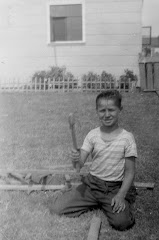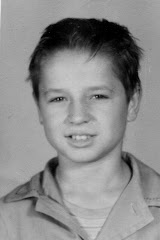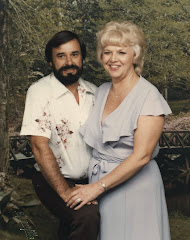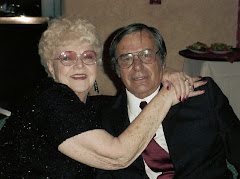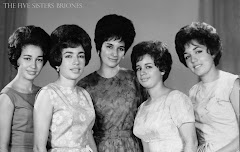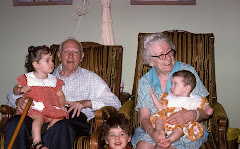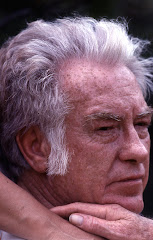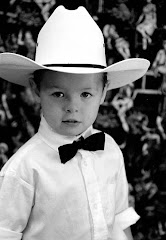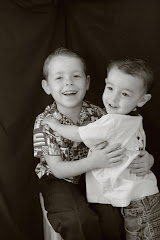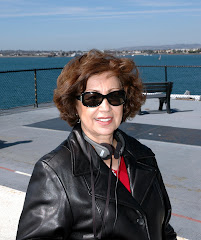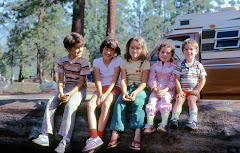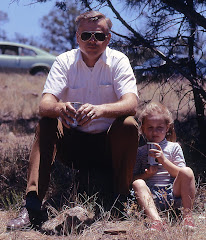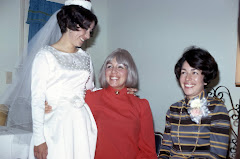There are no words that can make anyone feel the shock and pain of having a loved one diagnosed with a terrible disease that is both rare and incurably terminal. You have to have that same experience yourself in order to know what I mean.
Several years ago my little sister, the "baby" of the family was diagnosed with Pick's disease. Her particular case was classified as
Frontotemporal lobar degeneration, or simply, FTLD.
FTLD is an insidious disease in which the brain has tau proteins, an intrinsically disordered protein, which, when gone awry, cause the frontotemporal lobar brain cells to degenerate rapidly over time. Indeed, her brain scan had already revealed huge black areas where her brain once was in the frontotemporal region.
The problem was in the beginning she had doctors who told us her mental condition was due to her overly-long heart surgery and her brain may have suffered oxygen starvation. So, for two years we accepted that analysis. But when things kept getting worse, suspicions about the diagnosis arose, and that's when she was taken to UCLA medical center to see neurological specialists after a long and frustrating battle with quacks and insurance companies.
At UCLA they did a brain scan or x-rays. The "photos" were shocking, and we all felt the dread upon seeing the awful brain cell degeneration. Numbness filled my whole body. I did a little cursory research on the web and it hit me hard in the pit of my stomach. After some detailed research, my brother found out that the victims usually live 5 to 8 years after diagnosis. It was hard to take. Eight years seemed so far away. But, now, looking back, they flew by.
Knowing she had been diagnosed late into the disease, we tried to pinpoint the time we think it set in. It seems it began to manifest itself more obviously in 2009. She became oddly obsessive about certain things. She also was indifferent to her daughter's newborn children. Once proud to be a grandmother, her behavior seemed bizarre to those who knew her. At the time some feelings were hurt, but somehow no alarms yet went off.
When our mother suddenly died in 2010 from a fall, she was unemotional. It was as if she didn't realize our mother was dead. Instead she was more concerned about taking things out of the house immediately after her death that our mother had promised she could have after she died. This was not at all my sister's usual behavior. I was stunned by her response when I informed her she couldn't take anything out of the house until Mom's will was read.
Unfortunately, my mother, who was too superstitious about wills and death, failed to write any of her promises down, so all the things in the house belonged to her surviving husband. When I stated this, she uncharacteristically stomped her feet and yelled at me, "That's not fair. You're not being fair!" A mantra we all would soon hear over and over again the next few years.
In time her speech began to change. She was repetitive with words and phrases, and used the word "too" at the end of all her sentences. After a while she would add another "too" to the first "too". Sentences were then often ended with "too too".
People she had long known would approach her in public and she could not recognize them. She was also obsessed with certain types of religious things associated with her faith. She would play every day her recordings of the Mormon Tabernacle Choir, at full volume! She even did this when we went camping. It got so bad her ever-patient husband had to remove the CD from the camper's stereo player. But, she was so desperate to hear her beloved Mormon Choir, she took the CD, locked herself in the truck cab, and played it full blast while she sang along at full volume. Even with all the truck windows rolled up, we could hear her singing 20 feet away. It was both comical and heart rendering at the same time because deep in our hearts we knew it was a clear demonstration of her ever-declining illness.
In time her speech began to change. She was repetitive with words and phrases, and used the word "too" at the end of all her sentences. After a while she would add another "too" to the first "too". Sentences were then often ended with "too too".
People she had long known would approach her in public and she could not recognize them. She was also obsessed with certain types of religious things associated with her faith. She would play every day her recordings of the Mormon Tabernacle Choir, at full volume! She even did this when we went camping. It got so bad her ever-patient husband had to remove the CD from the camper's stereo player. But, she was so desperate to hear her beloved Mormon Choir, she took the CD, locked herself in the truck cab, and played it full blast while she sang along at full volume. Even with all the truck windows rolled up, we could hear her singing 20 feet away. It was both comical and heart rendering at the same time because deep in our hearts we knew it was a clear demonstration of her ever-declining illness.
In 2012 her daughter began a blog wherein she chronicled her behavioral changes. She worked tirelessly on putting together a foundation for dementia victims, and fighting social security, etc.
Some of the moments she recorded were comical moments, yet we knew that in time, she would pay the ultimate price for her rare disease. Surely, we were choosing to look at the brighter side of her remaining life.
Some of the moments she recorded were comical moments, yet we knew that in time, she would pay the ultimate price for her rare disease. Surely, we were choosing to look at the brighter side of her remaining life.
Some time later we were told she was suffering from semantic dementia — a type of dementia that erases one's ability for language skills. Soon she lost her ability to remember names of things; common things like "stop sign", etc., but she knew what you were supposed to do at one. But sadly, even that part disappeared. Soon she had no regard for concept of safety, crosswalks, red lights, or waiting before traffic had cleared. She had to be held tightly whenever we escorted her anywhere outside the home. In the drug store she pulled away from us and ran to the head of the line at the pharmacy window, went right up to the pharmacist to ask where her pills were.
On a trip to Montana to visit my brother, she saw cows, but didn't know what they were, or at least what to call them. While visiting there it snowed on her and she didn't know what was happening. It freaked her out. Rain had the same effect. It even seemed to have disturbed her, maybe even frightened her.
Right after her initial diagnosis at UCLA, the doctors, compelled by California law, reported to the state she could no longer drive an automobile. This upset her profoundly. She was proud of her driving skills, always bragging she never was cited and never exceeded the posted speed limit, etc. She was angry at "those dang doctors" at UCLA for having her driving license revoked. "I'm a good driver! I drive better than my husband! He touches the white lines!" she would constantly say. The ignition keys had to be locked away because she was determined to drive because those "stupid doctors" didn't know what they were doing.
After forgetting many words, well known people became unrecognizable to her as well. My brother, her childhood companion and protector, came down from Montana to visit her. She did not recognize him at first, and had to be helped by pointing him out in a living room full of family. Then it dawned on her it was her closest brother. Her recognition was short. It was over quickly and she moved on to other things. She didn't have the ability anymore to appreciate his presence and spend time with him.
On a trip to Montana to visit my brother, she saw cows, but didn't know what they were, or at least what to call them. While visiting there it snowed on her and she didn't know what was happening. It freaked her out. Rain had the same effect. It even seemed to have disturbed her, maybe even frightened her.
Right after her initial diagnosis at UCLA, the doctors, compelled by California law, reported to the state she could no longer drive an automobile. This upset her profoundly. She was proud of her driving skills, always bragging she never was cited and never exceeded the posted speed limit, etc. She was angry at "those dang doctors" at UCLA for having her driving license revoked. "I'm a good driver! I drive better than my husband! He touches the white lines!" she would constantly say. The ignition keys had to be locked away because she was determined to drive because those "stupid doctors" didn't know what they were doing.
After forgetting many words, well known people became unrecognizable to her as well. My brother, her childhood companion and protector, came down from Montana to visit her. She did not recognize him at first, and had to be helped by pointing him out in a living room full of family. Then it dawned on her it was her closest brother. Her recognition was short. It was over quickly and she moved on to other things. She didn't have the ability anymore to appreciate his presence and spend time with him.
During December of 2012 she went "Christmas shopping" with her daughter who attempted to steer her to gifts her husband might enjoy. Guy stuff like salami stocking-stuffers, colognes, etc. She would have none of that. She was so proud when she finally found what she was looking for, a one-gallon bottle of Gain laundry detergent. She beamed with pride as she placed it in the shopping basket, sure that her husband would be overjoyed with his gift.
It all seems like yesterday now, as she soon began to quickly degrade. All to soon she lost her ability to speak, even though she had long lost her ability to converse, she before could at least speak albeit repetitive phrases. She soon began to break out of the house and run, yes, run up the street and walk right into neighborhood homes of people she knew.
It then became obvious she needed 24 hour supervision, and later, locked security doors and gates. Her body was still in strong shape and she could easily outrun us. (I am much older than she is being 14 years her senior. In fact, she was only 5 yrs old when I permanently left home to join the United States Air Force).
It was painful to watch her lose her ability to communicate. Then the worst began — she lost her desire for food. We had known from research this day would eventually arrive. It seemed it arrived sooner than we had expected. Before she loved to eat "healthy" foods. She even boasted she was a "good cooker". Unfortunately she cooked everything at full flame, and burnt food to a crisp. The knobs to the stove had to be pulled off and hidden so she would start a fire. Her diet eventually digressed to peanut butter and jelly sandwiches. Then she began to forget she had eaten and would eat several a day. She put on nearly 60 pounds, and she was never one to be heavy. Even that didn't last long either.
It didn't seem long before she lost her obsession for those sandwiches and began to eat only one half a sandwich a day; then 1/4 a day. Then, sooner than we expected, she couldn't swallow. It was obvious her brain was shutting off her motor skills. The worst part was not even water could she swallow. We knew then that her time was nearly gone here on earth, and that those 5 to 8 years she was given had lapsed. The disease, it seemed, was right on schedule, as if it had to be. It was the time we all knew was coming, but tried to ignore. Speculations ran as much as six months, but a hospice doctor cut that time down to no more than two to three weeks. We were stunned. Reality came to rest upon our hearts and minds immediately and heavily.
A local camping trip was cut short after we went to see her and saw how she was so close. Going back gave us no pleasure as camping usually does. In two days it felt like we had been there three weeks. It was hard for me to focus, and I found it hard to keep track of the days we had been there. I told my wife we had to go home. She instantly agreed. That was two days ago.
Today, at 0640, my little sister passed away peacefully with her children and husband by her side. Slowly her life ebbed away. There was no gasping, no clamoring, just peaceful permanent sleep as her heart ceased to beat.My wife, daughter and I rushed to her side and stayed with her and the family until her body was transported to the funeral home. At her bedside a prayer was offered by a member of the clergy invoking peace and love for all her family. Thankfully, our state's laws do not require an autopsy on patients under a doctors care for the illness that took their life.
My sister was a faithful woman, to her God, her faith, and her family. I am at peace knowing she has her mind back now and in her heavenly reward enjoying those family members who have gone before us.
Some have said it's not fair that someone so kind and beloved should get such a terrible disease. But, that isn't the way life works. Life isn't fair, and was never meant to be. Yes, we are required to treat others fairly as fellow human beings, or, as God's children. But life itself has no such requirements. We knew that when we signed on to take this journey. We are here to endure and be subject to whatever life gives us. Over these things we have no control.
We move on after this life to greater and more beautiful things — to live in immortality, never to suffer physical pain again with the ultimate hope of eternal life with a loving Father in heaven, and His son, Jesus the Christ, who took upon himself the sins and sufferings of all who would repent and believe in him.


